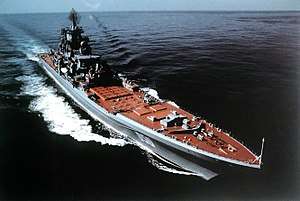Russian battlecruiser Admiral Lazarev
Admiral Lazarev (Russian: Адмирал Лазарев) is the second Kirov-class battlecruiser. Until 1992 she was named Frunze (Russian: Фрунзе) after a Project 68 cruiser (named after Bolshevik leader Mikhail Frunze); at that time she was renamed after Russian admiral Mikhail Petrovich Lazarev. The ship is currently laid up and in reserve status.
 Frunze c.1986 | |
| History | |
|---|---|
| Name: | Frunze |
| Namesake: |
|
| Builder: | Baltiysky Naval Shipyard, Leningrad |
| Laid down: | 27 July 1978 |
| Launched: | 26 May 1981 |
| Commissioned: | 31 October 1984 |
| Out of service: | 1999 |
| Renamed: | Admiral Lazarev |
| Status: | Laid-up in Abrek Bay, Fokino, Primorsky Krai, to be scrapped |
| General characteristics | |
| Class and type: | Kirov-class battlecruiser |
| Displacement: | 24,300 tons Standard, 28,000 (Full Load) |
| Length: |
|
| Beam: | 28.5 m (94 ft) |
| Draft: | 9.1 m (30 ft) |
| Propulsion: |
|
| Speed: | 32 knots (59 km/h) |
| Range: |
|
| Complement: |
|
| Sensors and processing systems: |
|
| Armament: |
|
| Armour: | 76 mm plating around reactor compartment, light splinter protection |
| Aircraft carried: | 3 Kamov Ka-27 "Helix" or Ka-25 "Hormone" |
| Aviation facilities: | Below-deck hangar |
Construction and design
She was laid down on 27 July 1978 at Baltiysky Naval Shipyard, Leningrad, launched on 26 May 1981, and commissioned on 31 October 1984.[1]
Differences from lead ship
Admiral Lazarev was constructed differently from the lead ship of the class. On the forward part of the ship, the twin SS-N-14 ASW missile launcher was replaced with 8 octuple SA-N-9 surface-to-air missile vertical launchers (planned, but not installed). On the aft part, a single twin AK-130 130 mm gun, similar to the guns used on Slava and Sovremennyy, was used instead of two 100 mm guns. Near the flight deck, the 30 mm CIWS cannons were moved to the aft superstructure and replaced with place for 8 octuple SA-N-9 vertical launchers (not installed). There were also some differences in the sensors, ESM/ECM suite and communication systems.[2]
Career
In August to November 1985 she sailed from the North via the Cape of Good Hope and the Malacca Strait to join the Soviet Navy's Pacific Fleet.[1] She visited Luanda, Aden, and Vietnam along the way. Holm writes that the ship only conducted local-waters training from 1987-92, and was inactive from 1994.
Fate
In 1999 the cruiser was taken out of service and prepared for scrapping as no money was available for its overhaul.[3] In 2004–2005 the cruiser's nuclear fuel was unloaded.[3] As of 2009 it was reported that the ship was moored near Vladivostok, in conservation status. The Russian Navy planned to modernize the ship and return it to active service, provided that the necessary funds were found.[4] In 2012 it appeared unlikely modernization would occur, as the ship was "considered to be beyond repair... will be scrapped, a source in the military complex says".[5] Admiral Lazarev has appeared in aerial imagery from 2006 to 2014 moored in the Abrek Bay mothball fleet, near Fokino, Primorsky Krai.[6][7] Its berth is around 6 kilometres (3.7 mi) from the Russian nuclear-powered vessel decommissioning facility at the Chazhma Bay naval yard. In northern summer 2014, Admiral Lazarev was painted at "30 судоремонтного завода" in the Chazhma Bay drydock to extend preservation time in the reserve fleet.[8] The latest aerial imagery shows the ship located at 42°55'46.0"N 132°25'08.0"E in the Bukhta Abrek.[9]
In April 2019, Russia decided to scrap and recycle the Admiral Lazarev in 2021.[10]
References
- "Project 1144 Kirov class". Michael Holm (www.ww2.dk/new). Retrieved 31 March 2020.
- Miller, David; Miller, Chris (1986). Modern naval combat. London: Salamander Books. p. 114. ISBN 978-0-86101-231-2.
- Адмирал Лазарев (in Russian). flot.com. Retrieved 18 July 2015.
- www.janes.com Archived November 14, 2009, at the Wayback Machine
- Pettersen, Trude (27 September 2012). "Only one nuclear cruiser to be modernized". Barents Observer. Retrieved 18 July 2015.
- Google Earth Images from September 2006 to May 2014
- Тымченко, Сергей (7 April 2014). "Photo of Admiral Lazarev". Panoramio. Archived from the original on 24 September 2015. Retrieved 18 July 2015.
- Крейсер "Адмирал Лазарев" подготовили к стоянке на ТОФ. flotprom.ru (in Russian). 17 December 2014. Retrieved 18 July 2015.
- "Google Maps". Google Maps. Retrieved 2018-07-13.
- "Russia decides to scrap its legendary nuclear-powered battlecruisers to save money". Defence Blog. 2019-04-22. Retrieved 2019-04-23.